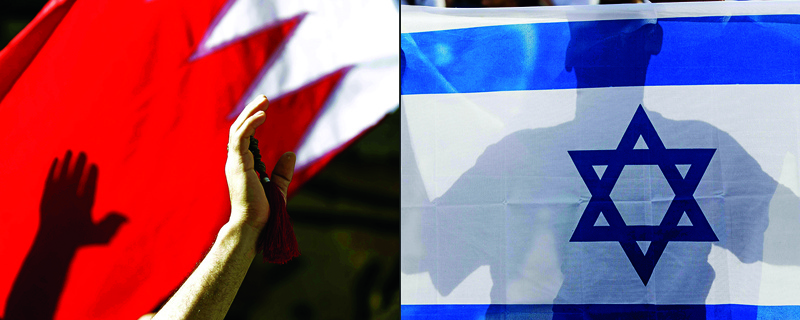
MANAMA: Bahrain's contacts with Israel, thought to have started discreetly in the 1990s, accelerated in recent years towards the historic agreement to establish diplomatic relations announced on Friday. Bahrain is the second Gulf state to announce a normalization deal in the space of a month, following in the footsteps of its neighbor the United Arab Emirates, which agreed an accord seen as a "betrayal" by Palestinians longing for an independent state.
Like most other Gulf countries, Bahrain shares with Israel a common enemy in Iran, which Manama accuses of instigating protests by the nation's Shiite Muslim community against the ruling Sunni Al-Khalifa dynasty. But it is not likely to have acted without a nod from Saudi Arabia, its close ally just across a narrow causeway from the island state.
First meetings
Following years of low-key contact, Bahrain's crown prince Sheikh Salman bin Hamad Al-Khalifa kicked off official diplomacy with talks with Israeli officials during World Economic Forum summits in 2000 and 2003. The two nations' foreign ministers met at the United Nations in 2007 and two years later, Israel's then-president Shimon Peres and Bahrain's king reportedly met in New York on the sidelines of a UN conference.
An official Bahraini delegation travelled to Israel the same year on an unprecedented trip to recover a group of nationals held by the Jewish state. The Bahrainis in custody were among pro-Palestinian activists on a ship seized by the Israeli navy as it headed for the Gaza Strip in defiance of Israel's blockade. Bahrain's parliament, ignoring government objections, passed a bill in October 2009 to outlaw any contact with Israel on pain of prison. The bill needed clearance by the consultative council, a body appointed by the king, which rejected it.
'Defending' Israel
The 2011 Arab Spring movement slowed down normalization efforts while the monarchy faced a wave of protests led by Shiite Muslims demanding reforms. But in September 2016, Bahrain's foreign minister Sheikh Khalid Al-Khalifa paid tribute to Shimon Peres when the former leader passed away, in a surprise statement that drew strong Arab criticism on social media.
In 2017, the rapprochement went public when an Israeli delegation was allowed to take part in the FIFA Congress taking place in Manama. Sports diplomacy featured again when an Israeli driver was permitted to participate in a major car race. Also that year, an interfaith group from Bahrain said it had sent a delegation to Israel to promote "tolerance and coexistence" at a time of Arab anger over the fate of Jerusalem. And in May 2018, the foreign minister backed Israel's right to "defend itself" after the Israeli military said it struck dozens of Iranian military targets in Syria, marking a rare, if not unprecedented public stance by an Arab government.
Accelerating efforts
In 2019, the countries drew noticeably closer to each other. In June, a US-organized economic workshop in Bahrain failed to deliver tangible results over the long-awaited Middle East peace plan, but it opened the door for closer Israel-Gulf ties. In an unprecedented interview of a senior Gulf official by an Israeli journalist, Bahrain's foreign minister said on the sidelines of the two-day workshop that Israel is part of the region's heritage.
A month later, Israeli Foreign Minister Israel Katz announced that he had met his Bahraini counterpart during a visit to Washington. In October, representatives from more than 60 countries, including Israel, met in Bahrain to discuss maritime security following attacks on tankers in the Gulf and Saudi oil installations. Iran, which was accused of the strikes, was not present.
Bahrain welcomed the surprise UAE deal with Israel on August 13, calling it a "historic" step. However, King Hamad bin Isa Al-Khalifa said he told visiting US Secretary of State Mike Pompeo that his country remained committed to the Saudi-sponsored Arab Peace Initiative, which calls for Israel's complete withdrawal from the Palestinian territories occupied after 1967. Nevertheless, Manama later agreed to allow UAE flights to and from Israel to overfly the kingdom, a day after a similar decision was announced by Saudi Arabia.- AFP










